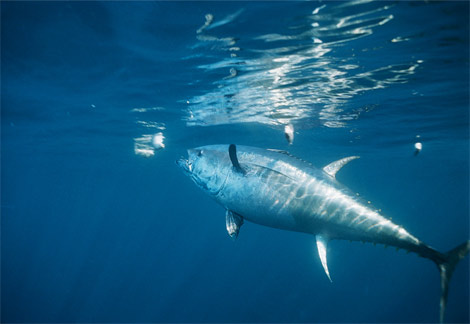The Report On Seafood

While in the last 40 years the human population has risen 75% from 4 billion to 7 billion, the world’s mammal, bird, reptile, amphibian and fish populations have fallen by half. Some species have fared worse than the average decline. The report shows an index of 17 species of mackerel and tuna plummeting 74% between 1970 and 2010.
Fishery collapses can be drastic and sudden. Canadians will remember the collapse of the cod fisheries of the Atlantic, where a combination of greed and lack of foresight caused a catastrophic drop in the largest cod fishery of the world, reducing the biomass of the species to 1% of its former levels in the early 1990s. Even now over a decade later, stocks have not recovered. The world depends on fish as a source of food and a source of income, but this dependence has put a toll on species that are struggling to stay alive as demand grows.
There is a huge focus worldwide on populations of bluefin and yellowfin tuna, along with other premium sushi fish, but there needs to be an awareness of the base of the food chain. Feed conversion ratios for large fish such as tuna are generally between 15-20:1, meaning that for every kilogram of tuna in the grocery store, there was a required 15 to 20 kilograms of smaller fish – including mackerel. This is one of the reasons that it is difficult to farm tuna. The species, as an apex predator, require a huge amount of food to sustain their speed and size. If mackerel populations lose more of their biomass, the impact on apex predators and the entire ocean food chain will be felt.
Some Fish But Not Others
The World Wide Fund for Nature is obviously a pro-conservation and pro-nature group. While the decline of 74% in tuna and mackerel populations may seem drastic, it is important to note that the majority of the decline occurred in the 1970s and 1980s. While there has been slight decline since, populations have not been continuing the steep plummeting of past decades. Unfortunately, there have been no signs of overall recovery, but ocean conservation groups such as the Marine Conservation Society and Monterey Bay Aquarium Seafood Watch still list most species of mackerel as “fish to eat” and “best choices”. Mackerel is however missing from the Marine Stewardship Council’s list of fish to eat. When mackerel can experience such a drop and still be considered a good choice to eat compared to other options; I personally start to get worried at how bleak the big picture is.
As stocks of fish drop, competition for dwindling supplies intensify. China, the nation with the largest fishing fleet in the world, has been increasing their fishing fleet, especially for tuna. Radio Australia reported in 2003 that Chinese fleets were receiving 4.1 Billion dollars in subsidies for fishing tuna, with a 5 year plan to increase the fleet of 1300 by 300 as of 2015.
Nations continue to fish against illegal fishing in their waters. Indonesia blew up 41 foreign fishing boats in May of 2015, including risking an international incident by exploding a Chinese fishing boat seized in 2009. There have also been allegations of under-reporting of international catch by China. The Fish and Fisheries report in 2014 estimates that the true catch was an estimated 4.6 million tonnes per year, whereas China declared only 386,000 tonnes. This was facilitated by increased catch in African waters, where it is more difficult to monitor and regulate fisheries. For further information, this article can be found at http://onlinelibrary.wiley.com/doi/10.1111/faf.12032/ (PDF document).
Difficulties In A Changing Climate
The barriers to sustainable fishing are huge. Fisheries form the livelihood of over 10% of the world, and restricting fishing can lead to thousands of people forced into unemployment without marketable skills outside of their industry. Increased regulation leads to increases in prices, and as prices rise the reward for illegal and unreported fishing increase as well. The reality of the global oceans means that multiple countries compete for the same resources, and if any one country voluntarily reduces their fishing, their economies suffer while other countries profit. While international agreements are in place to support sustainable fishing, they have been unable to bring back the populations of fish to the levels seen before industrialized fishing and trawling. Even more depressing, it is not only over-fishing that is the cause of the decline. Ocean acidification, rising sea temperatures and population are all putting our oceans at risk. If populations are going to return to sustainable levels, a concrete, global effort to protect our ocean’s will be required.
I have always been fascinated by the creation and culture of different foods, particularly sushi and sashimi in the modern era of Japanese cuisine. I am a classically trained chef and sushi connoisseur, also having operated a food service company and enjoy investigating and experimenting with food around the world.